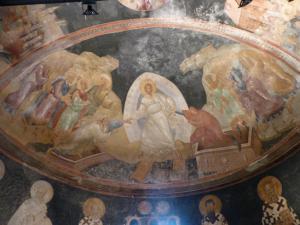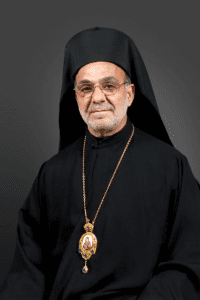 The great feast of the Ascension of the Lord is a summation of the entire Christian life. In the Ascension, we are reminded that this life on earth is not our final destiny. Our Lord and Savior Jesus Christ ascended 40 days after His resurrection to prepare a place for us with His Father.
The great feast of the Ascension of the Lord is a summation of the entire Christian life. In the Ascension, we are reminded that this life on earth is not our final destiny. Our Lord and Savior Jesus Christ ascended 40 days after His resurrection to prepare a place for us with His Father.
That is our ultimate destination and should be the object of our thoughts, words, and deeds on a daily basis. However, this phronema or outlook concerning our lives and the world around us is only gained through a vibrant interior spiritual life. It is strengthened and not weakened when we endure suffering, and such is our experience in the past year with the pandemic. Those who greet the feast of the Ascension with joy and anticipation understand that temptations and trials are gifts from the thrice holy Lord of glory to perfect and sharpen our repentance.
Metropolitan Tikhon Shevkunov, when he was the Abbot of Sretensky Monastery in Russia, offered these words in an Ascension homily recalling the New Martyrs suffering in the concentration camps of the Communist Soviet Union:
“Forty days after Pascha, on Solovki, where St. Hilarion presided over the Paschal services, the Lord’s Ascension was naturally also celebrated. Of course, the host of imprisoned priests and laymen also sang the great and beautiful words of the Ascension kontakion hymn, ‘I am with you, and no one can be against you.’ Perhaps many of them went to their suffering and death with these words on their lips, firmly believing that the Lord Jesus Christ is with them; they are the victors, and no one can conquer them. ‘I am with you, and no one can be against you!’ They disdained their own flesh, they disdained outward victory so highly prized in this world, for the sake of following the Truth they had found in following Christ.
This, brothers and sisters, is what I would like to say today. But how very different we are from those new martyrs and saints who overcame the world! When we stand before God to repent of our evil and sins, our confession from year to year becomes less and less like a confession and more and more like a faint-hearted cry and complaint against life. The great power of Christianity is forgotten; we have forgotten that we must be conquerors in this world—conquerors of evil. Constant complaints about our neighbors, about our life circumstances, endless depression and despair—these things are woefully conquering the Orthodox Christian today.Faintheartedness instead of courage is becoming a major quality of the soul of modern man. In your patience possess ye your souls (Lk. 21:19). Many people, even in the Church, are forgetting about this patience and courage, forgetting that everything on this earth is sent from the Lord, even in these particular circumstances that God has called us to be in; forgetting that we must labor and force ourselves patiently and courageously. People seek a compromise, an easy path and self-justification, and as a result the Christian spirit is lost. However, a fearful Christian is not pleasing to the Lord. The spirit of God departs from such a person and leaves him one on one with his helplessness, his frailty, his terrible despondency, when instead he should be gaining at long last the wisdom to thank the Lord for all the trials He has sent; thank Him, because a true knowledge of God comes only through thanksgiving. Fallen man cannot come to know God in any other way.”
May your faith be strengthened in the Ascension of the Lord Christ Who has overcome the world and death, trampling down death by death in His own death and resurrection. May the thrice holy God grant you wisdom and much peace!
———————-
 You can find other thoughts from Bishop Thomas here, here, here, here, here, here, and especially this one of the work of ministering to differently abled folk in the church.
You can find other thoughts from Bishop Thomas here, here, here, here, here, here, and especially this one of the work of ministering to differently abled folk in the church.












